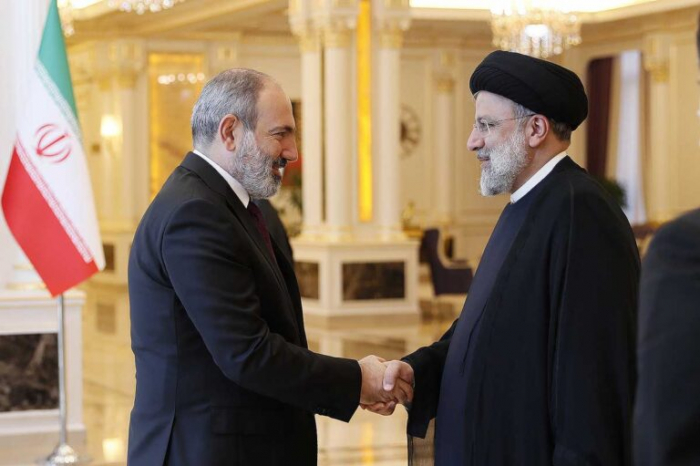In early December, the Azerbaijani media reported about free of charge military supplies of Iran to Armenia amidst the growing tensions between Azerbaijan and Islamic Republic. According to the reports, Islamic Revolutionary Guard Corps (IRGC) provided 500 units of the Dehlavieh anti-tank missile system and 100 units of Almas system to Armenia at the end of October. These supplies took place amidst the military exercises the Iranian army carried out along the borders with Azerbaijan for the second time since the end of the Second Karabakh War of 2020 – Iran never conducted military drills along the Azerbaijani borders before this war. Along with these, Azerbaijani media published evidence confirming that Iran also sends military personnel to the separatist Armenian forces in the Karabakh region of Azerbaijan that is currently under the temporary control of the Russian peacekeeping units. They are reportedly supposed to train the Armenian separatist forces who regularly carry out terrorist and sabotage attacks against the Azerbaijani army.
Although Iran has always, since the post-Soviet independence of Azerbaijan, treated Armenia as an ally against Azerbaijan and even provided military and economic backing to Armenia’s occupation of the Azerbaijani territories in the early 1990s, Baku sought to keep these hostilities down and tried to build good neighborly relations with the Islamic Republic. A number of factors affected this decision of the Azerbaijani government, including the presence of more than 20 million ethnic Azerbaijanis in Iran as well as Baku’s efforts to establish friendly relations with the neighboring countries and ensure the Iranian leaders that Azerbaijan did not pose any threat to the Islamic Republic. Towards this end, the Azerbaijani government even quietly reacted to Tehran’s support to the radical religious groups inside Azerbaijan by cracking down only on these groups without challenging the country’s broader relations with Iran.
This curtain was lifted between Baku and Tehran following Azerbaijan’s liberation of its occupied territories from the Armenian occupation. Although the Iranian leaders repeatedly relate their “concerns” with Azerbaijan’s alleged plans (in particular, the “Zangazur corridor” transportation route) to cut off Iran-Armenia border by occupying the southern territories of Armenia, these statements do not sound convincing. There are assurances not only by Azerbaijan but also Armenia’s another ally Russia that these transportation routes do not envisage the occupation of anyone’s territories, and they will remain under the sovereignty of the respective transit country.
Iran’s aggressive rhetoric and military flexing against Azerbaijan shoot up against the background of Azerbaijan’s decision to open an embassy in Israel and Turkiye’s growing influence in the South Caucasus. In this context, Iran’s narratives resemble those of Russia against Ukraine. In a similar vein, Iranian leaders question Azerbaijan’s independence and its ethnic identity, claiming that Azerbaijan was a historical part of Iran and should return to the Iranian control. One of the latest such claims was made by Deputy Commander-in-Chief of the Islamic Revolutionary Guard Corps, Ali Fadavi, who, in a tweet, reiterated these historical claims against Azerbaijan saying that this country “was separated from Iran due to the incompetence of the Qajar kings”. Attempting to take the advantage of the Shiite believers in Azerbaijan, he openly called for a government change in Baku. “The people of Azerbaijan are Shiite believers who did not lose their original Shiite beliefs under the 70 years of communist pressure. As a rule, there should be a government that pays special attention to this Shiite majority of Azerbaijan”, he added.
Thus, Iran, building active cooperation with Armenia in military and economic fields, poses a great threat to the national security of Azerbaijan. In response to these threats, Baku boosts its ties with the major allies of the country, in particular, Turkiye and Israel. Hence, over the last two months, Baku held two major military exercises along the borders with Iran which, according to President Ilham Aliyev of Azerbaijan, aimed to “to show that we are not afraid of them”. While the first round of these exercises was held exclusively by the special forces of Azerbaijan in early November, the second round was conducted at much larger scale and together with the Turkish armed forces in early December.
These joint exercises included also a response to the most provocative element of the Iranian military drills – employing phantom bridges to cross the river that forms the natural border between Azerbaijan and Iran in most sections of the interstate border. Turkiye’s Defense Minister Hulusi Akar, who joined his Azerbaijani counterpart to supervise the exercises, voiced strong support to Azerbaijan, declaring that any threats or provocations against Turkiye and Azerbaijan is considered as directed against both countries.
In parallel to demonstrating military confidence of Azerbaijan in response to the Iranian threats, Baku has also become more outspoken against the repression of the fundamental rights of ethnic Azerbaijanis under the Iranian control. Addressing an international conference in Baku on November 25, President Aliyev criticized the lack of Azerbaijani language schools in Iran while there are those in the languages of other ethnic minorities, vowing that his country will do its best to protect all Azerbaijanis across the world, including those living in Iran.
That said, the aggressive rhetoric and expansionist claims of the Iranian leaders dramatically threaten peace and security in the South Caucasus. In this context, Armenia’s alignment with Iran in this power game and the de-facto military alliance they build against Turkiye and Azerbaijan run the risk of triggering a major conflict in the region with catastrophic consequences for the local peoples.
Vasif Huseynov is head of department at the Baku-based Center of Analysis of International Relations (AIR Center).
More about:
















































